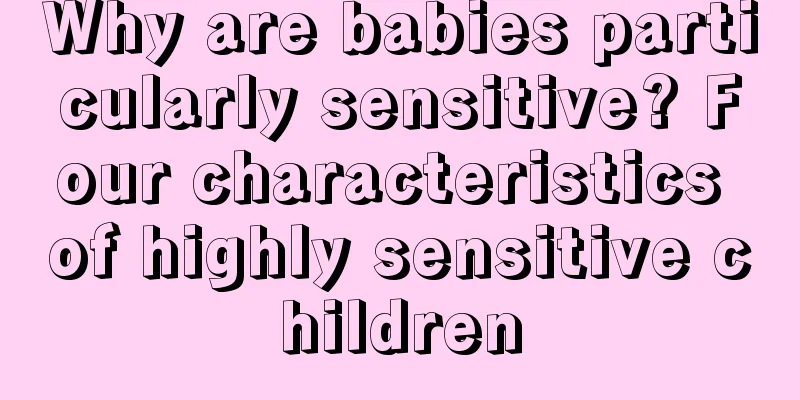Why are babies particularly sensitive? Four characteristics of highly sensitive children

|
The issue of skin sensitivity has always been a frequently discussed topic. Recently, I learned about Dr. Airong’s new conclusions on sensitivity research in a well-known foreign book, in which he sorted out four characteristics of highly sensitive people and highly sensitive children. I think it is very worthy of reference for friends with related symptoms. Four characteristics of highly sensitive childrenPeople who are more sensitive than others have these four characteristics, so if you do not meet these four points, you should not have the trait of being "more sensitive than others" mentioned here. These four characteristics are as follows: D (Depth of processing) O (being easily Overstimulated) E (being both Emotionally reactive generally and having high Empathy in particular) S (being aware of Subtle Stimuli) Please remember this DOES. —The Highly Sensitive Child Dr. Ai Rong, who has been researching for 20 years, asserts that only those who meet these four characteristics are highly sensitive people and highly sensitive children, and this is also her idea and definition of highly sensitive people and highly sensitive children. The following will incorporate my understanding to explain these four characteristics. Feature 1/Deep Processing (D) Easily over-stimulated and sensitive to subtle changes, I believe everyone can understand the above content, but in fact, highly sensitive children will process this information more "deeply" than ordinary people. The most common characteristics are as follows: 1. They will ask tough questions that get to the heart of the matter. 2. He would use words that adults have said without fully understanding them, which is totally inappropriate for his age. 3. Have a sense of humor. 4. They will consider various possibilities and act cautiously, which is why they are unable to make a decision. 5. They will observe carefully before thinking, so they take more time to actually take action. The inability to make a decision and feeling confused are often regarded as "timid", "introverted", and "indecisive", but in fact, they have such external manifestations because they process deeply in their hearts. Recently, there has even been research to obtain the following information. There is a new piece of information about the deep processing characteristics of highly sensitive people. Jagiellowicz and others used functional magnetic resonance imaging (fMRI) to study the activity of the human brain and showed two slightly different photos to the subjects. The results showed that compared with ordinary people who only observe surface features, highly sensitive people will observe more complex features and details, and their brains are more active at this time. Simply put, the brains of highly sensitive people can process sophisticated information more "deeply" than ordinary people. - "The Highly Sensitive Child" When I was examining highly sensitive people and children, I also found that their brains have a high ability to process information such as facial expressions. Characteristic 2: Overstimulation (O) I often use the method of fishing with a ground troll net to illustrate the state of sensitive people when they receive a lot of stimulation - the larger the mesh size, the easier it is for small fish to slip away. But sensitive people have very small mesh sizes, which not only catch small fish, but also other unnecessary things, causing the net to become heavier and heavier, and of course they will be exhausted when they collect the net. This is the state of over-stimulation, when the body and mind are overloaded, they will feel more tired than ordinary people. German scholar Friedrich Gerstenberg once studied the situation that highly sensitive people are prone to over-stimulation. In the study, the subjects were asked to watch the letters L in different directions appearing on the computer screen, and then judge whether there was a letter T in the middle. This was to let the subjects perform a somewhat difficult cognitive task to compare. The results showed that highly sensitive people can make correct judgments in a shorter time than ordinary people, but they are also more tired than ordinary people after completing the task. —《The Highly Sensitive Child》 Even if you arrange activities or take them out to please them, they will gradually lose energy due to fatigue and even ask to "go home". This is a major characteristic of highly sensitive people - they are not unhappy, but simply exhausted from excessive stimulation. Other characteristics include the following: 1. After being overly excited, you will not be able to sleep that night. 2. Very afraid of pain. 3. Pay excessive attention to the hot or cold weather, dirty hands and feet, wet clothes, ill-fitting shoes, etc. 4. He is very afraid of being surprised by others. 5. When being the center of attention or being tested, one is unable to perform to one’s full potential. Characteristic 3/ Strong emotional response, especially strong empathy (E) Highly sensitive children are not only sensitive to things, but also to emotions, so they cry a lot, are easily frightened, easily afraid, and even upset. This is because their emotions fluctuate more intensely than those of ordinary people, and this sensitive reaction is not only directed at themselves, but also at others. A mother once told me that her three-year-old son gave her his glasses and said to her, "Mom, are you looking for this?" She was startled and asked her son, "Where did you find it? How did you know that I was looking for glasses?" The son replied, "I saw you looking around while cleaning, so I thought, Mom, you might be looking for glasses." Sensitive children have a way of observing others and sensing what they are thinking. It is a wonderful thing that such small details can be so thoughtful, but such children are also twice as sensitive to emotions such as sadness and anxiety as humans. He was standing next to me and saw me scolding my brother, and he actually started crying. I was really confused. The person being scolded didn't cry, but he cried instead? Because my grandpa was ill, I thought this might be the last time we would see him, so I took my children to the hospital to visit him. I had visited my grandpa before and he was fine, but this time he seemed to sense the tense atmosphere and froze as soon as he approached the ward, and he didn't go in until the very end. The death of the family pet made the child very sad. Even after several months, the child kept crying. Dr. Junko Moritsu, a hospice care, likened the high empathy of sensitive people to "tuning forks." No matter who you are, everyone has a "tuning fork that can resonate with other people's emotions" in their hearts, but the number, size and function of this tuning fork vary from person to person. If the average person responds to emotions such as "happy, sad, happy, afraid..." with ten small tuning forks, then people with rich feelings have about one thousand to ten thousand large tuning forks. - "The Heart of Childhood" (Chinese translation: Face up to the psychological troubles of children, KK Bestsellers) The number of tuning forks that can feel resonance in each person's body is different. If you apply this thinking model to understanding highly sensitive people and highly sensitive children, it will be very easy to understand. Feature 4: Ability to perceive subtle stimuli (S) The fourth characteristic is that they are easily and sensitively aware of subtle stimuli, including tiny sounds, faint smells, subtle differences in taste, subtle changes in people and objects, and other small details that most people would not easily notice. These trivial matters that are regarded as "no big deal" and easily ignored are of great concern to highly sensitive children. Regarding this point, Dr. Airong said, "Some people have particularly developed sensory organs, but most of them do not notice the details because their sensory organs overreact, but because their thinking and emotions are too high. This is also the difference from the depth of information processing, which is difficult to distinguish clearly." In daily life, many mothers often see highly sensitive children react sharply to trivial matters. My child is very sensitive to the taste of the food he eats. A while ago, he took a bite of fried eggs and shouted "It's so nasty". It's really frustrating when the food you worked hard to cook is disliked by your child. After taking a shower, he will never use a towel that is not his usual one. I think it is because of the touch. But even if I give him another towel, he will be wet all over and yell, "I want the old one!" I got a new bath sponge, but my child kept saying "it hurts" and didn't use it at all. But the old one had already been thrown away, so I really wanted to tell him not to be so exaggerated. We have to cut off the labels on our clothes because the kids say they hurt and if they are not cut cleanly, it seems to irritate their skin. So I have to carefully unsew the seams and remove the labels, which is really time-consuming. No matter how good the brand name clothes are, they don't even have the label when they arrive at my house. My child is very sensitive to smells. Even in stores or on public transportation, he would still yell "It stinks, it stinks" and look like he was about to vomit, which was very troublesome to me. Other characteristics of highly sensitive children include reactions to chemical ingredients in food, or sensitivity to medications, which can be too strong if you take the medication according to the instructions on the prescription. It is really hard to take care of highly sensitive children, but sometimes there is another side. Every time I come back from getting my hair done, my son always notices that my hairstyle has changed before my husband does, and he always says to me, “Mom, you look good like this.” Whenever he sees that my husband and I are about to have a quarrel, he will cry and say, “Dad, don’t bully Mom…” Thanks to him, my husband and I will stop arguing and experience what it means that “children are the lubricant of family life.” |
<<: Why does the baby's nose whirr when sleeping? Four reasons to pay attention to
Recommend
Can babies eat mulberries? At what age can babies eat mulberries?
Although mulberries taste sweet and many people l...
What is the difference between teether and teething stick?
Both teethers and teething sticks are used for ba...
Is snoring hereditary? Intraoral correction of snoring in young children can be improved
Some parents don't know what to do with their...
What can't babies under one year old eat? Common foods such as soy sauce are not allowed
Parents with babies at home know that after six m...
Can babies drink sour plum soup? Can babies drink sour plum soup?
Sour plum soup is a common summer drink. Its swee...
How far can a baby see after 30 days? A diagram of the baby's vision development process
The baby's eyes are not open when he is born,...
What does the fate of a child born in Guyu represent?
In ancient times, Chinese people believed in fate...
Supplementing lutein helps children prevent myopia from getting worse - which brand of lutein is good for children
If a child develops myopia at a young age, it wil...
How to relieve postpartum uterine contraction pain? Causes of postpartum uterine contraction pain
Postpartum uterine contraction pain is a normal p...
Is doula necessary for childbirth? What are the advantages and disadvantages of doula childbirth?
I believe some mothers have heard of doula delive...
Should children's teeth be thrown away? What should children's teeth be filled with?
Children will start to replace their teeth at a c...
What are the symptoms of premature birth? What should you pay attention to when you have premature birth?
Premature birth is a common phenomenon. There are...
Why can't babies with eczema be vaccinated? Why should babies with eczema be moisturized?
Babies need to be vaccinated after birth, and the...
2017 Primary School Summer Homework Answers 2017 People's Education Edition Primary School Summer Homework Answers Summary
Answers to the 2017 elementary school summer home...
Can you touch a newborn's head? It is not recommended.
Many parents are curious and excited about being ...









